Data and statistics are the lifeblood of development planning. Without accurate, timely data, development planning and implementation is a shot in the dark.
A panel discussion at the 7th Africa Regional Forum on Sustainable Development heard how Africa needs to invest in timely and quality statistics and analysis to better implement various programmes to achieve the SDGs. But often this is not the case and can Africa do better? Yes, believes Mr. David Everatt, Chair of the Statistics Council in South Africa, who participated in the panel discussion. He shares perspectives on why quality data and straight statistics are good for development planning and decision making:
ECA: Do we really need statistical data?
Mr. Everatt: You don't, but government does. Where is the right place to invest, who is showing high need - hunger, health, whatever - is this intervention working or having perverse outcomes - you can certainly do small scale qualitative studies, but they are not representative and you need accurate, representative stats to know what to do.
It is commonly accepted now whether you are in business or government, the most important commodity now is data. It is what people are paying the most for and what people are harvesting left right and centre. It can be used for bad purposes like Cambridge Analytica tried to do in unethical behaviour. It can be used for promotional behaviour like what people are buying, what they eat and where they go. The notion that we cannot do without data is unthinkable. We cannot ignore data.
Is there difference between data and statistics?
Statistics is one way of manipulating data.
What is the role of data and statistics in development planning?
You'd normally use qualitative and quantitative data in planning, to ensure that your plans match what local communities/beneficiaries want, unless you want a horrible mismatch and resultant wastage.
There are fears that data from Africa are not reliable, could this be an exaggeration?
There are mistakes made in data gathering in every country of the world and would not see that Africa is somehow worse or better than anywhere else. Other places are probably more advanced in terms of the collection of digital data. All over the world data are subject to manipulation and I do not see Africa is worse off. We have battled to get the technology working as fast as the rest of the world.
What can we learn from the South African experience?
The Statistics Council does nothing but advise and Statistics South Africa (Stats SA) does the work. We are there to verify statistics, they gather and analyse it and we sign off on it. Stats SA had started on what was a five-year strategy to go digital, some of that was relatively easy for anyone who can link up data sets, for example, we are able to get live time data in real time. We were heading down that path and we thinning about the implications of going digital and COVID hit and we could not use field workers. Stats SA had to pivot really quickly.
Data and statistics have bandied about in discussions about SDGS and COVID19 pandemic, what insights can we gain from using data and statistics?
COVID 19 has made it very clear that data are power. Learn to separate headlines from properly gathered, verified, analysed and carefully reported statistical analysis. Try and avoid anything that looks rushed, or headline-grabbing (often the modellers) or overtly political, such as the vaccine deniers etc.
Do we need new models of data collection in the light of COVID19?
Absolutely. Fieldworkers are now perceived as vectors of disease - so a population in lockdown, and in fear of infection, is not going to welcome a stranger into their house. We are currently doing all fieldwork outside, under gazebos etc., as we gather call phone numbers to switch to CATI (computer aided telephone interview).
What advice would you give for African countries in terms of investing in data collection tools?
Get ahead of the technology curve and make sure we are equipped - if not, the private sector, which has its own interests at heart, will dominate the field.

